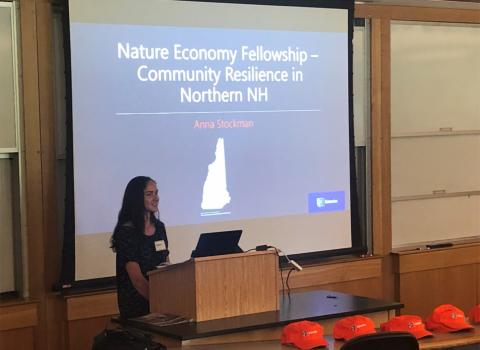Community Strengths & Nature in Northern New Hampshire

Regardless of where you go, each and every community has its unique strengths and weaknesses and approaches opportunities and challenges differently. How a community responds to opportunities and challenges can be defined as community resilience. While factors like community-based issues and weather-related events can negatively affect a community’s level of resilience, community and economic development initiatives can have a positive effect on community resilience.
This summer, I, Anna Stockman, have had the opportunity to join UNH Cooperative Extension’s Community and Economic Development team as a Nature Economy Fellow. A native of Exeter, NH, I’m a rising senior at UNH studying community and environmental planning. My goals are to work in the planning profession in the region and this fellowship is giving me an opportunity to learn more about the region as well as gain valuable communication and data analysis skills.
 In this fellowship, supported by the National Science Foundation, I have worked closely with my mentor, Dr. Shannon Rogers, a Nature Based Economic Development Specialist and Associate Extension Professor, to not only assess community resilience in northern New Hampshire, but to also compare community resilience and ecological resilience in Coos, Carroll, and Grafton counties. While we collect community data, scientists at the Hubbard Brook Research Foundation, are collecting data revolving around nature’s strengths and weaknesses in the region. We are contributing to a larger effort to determine whether there is a correlation between community resilience and ecological resilience and establish what that means for northern NH.
In this fellowship, supported by the National Science Foundation, I have worked closely with my mentor, Dr. Shannon Rogers, a Nature Based Economic Development Specialist and Associate Extension Professor, to not only assess community resilience in northern New Hampshire, but to also compare community resilience and ecological resilience in Coos, Carroll, and Grafton counties. While we collect community data, scientists at the Hubbard Brook Research Foundation, are collecting data revolving around nature’s strengths and weaknesses in the region. We are contributing to a larger effort to determine whether there is a correlation between community resilience and ecological resilience and establish what that means for northern NH.
In many of the communities in Coos, Carroll, and Grafton counties, we are talking to volunteers that work on conservation and economic development issues within their communities and asking questions that address their community values, industries, strengths, challenges, and envisions for the future. The majority of those that have been interviewed so far serve on conservation commissions or economic development committees.
Prior to starting the process of data collection, in order to develop a better understanding of resilience and the region of study, I researched literature pertaining to different types of resilience (i.e. social, ecological, economic, etc.) and conducted background research on northern NH. In doing so, I learned about the unique demographics, strengths, and setbacks that make northern NH a significant area to study.
So far, I’ve interviewed nineteen people, most of whom are volunteers that work to keep their community’s economy robust and their nature strong. Some preliminary themes from interview responses are showing that the rural location and character are what these individuals value most about their communities. Nature does in fact play a role in the identity of these towns and cities. What makes these communities strong are their scenic settings, community involvement and natural resources.
Stay tuned for future findings as we continue to talk with volunteers in these counties!
